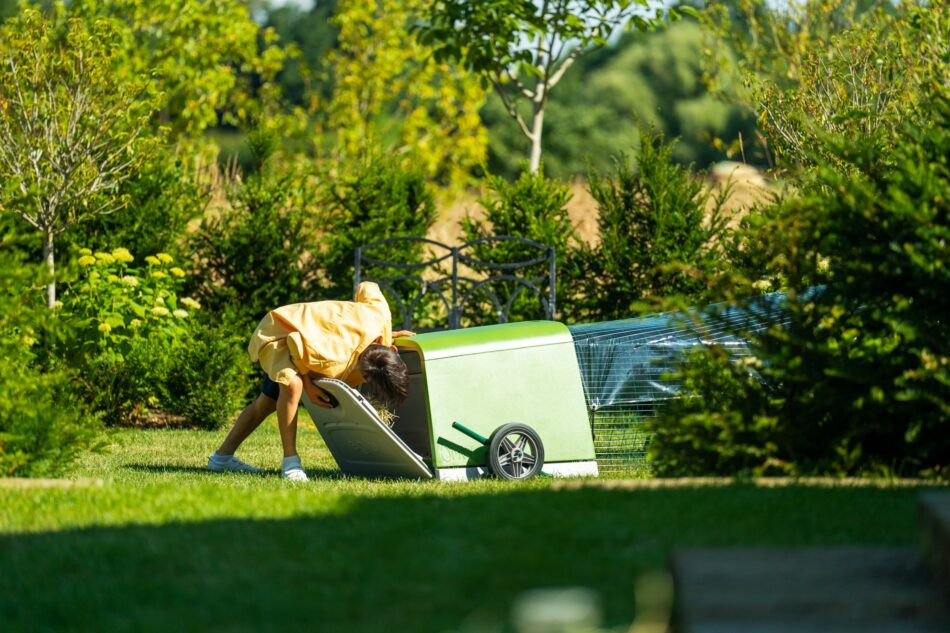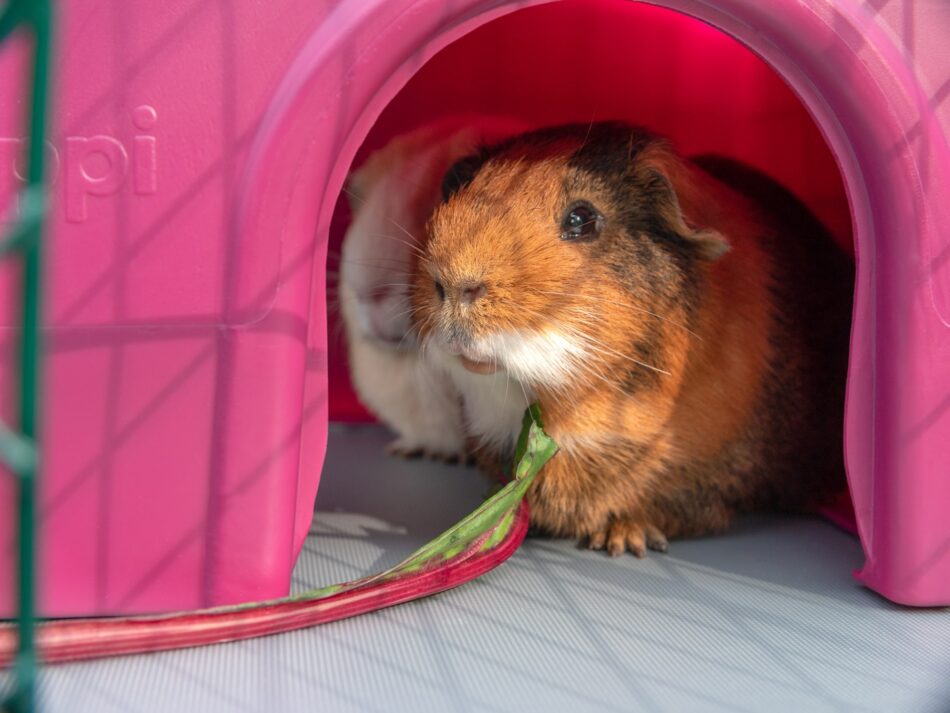Why do guinea pigs hide?
New guinea pig parents often find themselves wondering why their piggies hide. Are they scared? Shy? Stressed out? There are many reasons why cavies seek undercover solace — most of which stem from natural behaviours instead of external stressors. So why do guinea pigs hide? We’ll explore the reasons why guinea pigs hide, so that you can gain a better understanding of this innate behaviour.
Danger ahead
Guinea pigs are prey animals, so they’re on constant alert for potential threats. Wild guinea pigs have to keep an eye out for predators as a means of survival, but this natural behaviour remains strong in domesticated cavies. Being low to the ground, everything that’s taller than themselves may be perceived as a threat — which is just about everything aside from other guinea pigs.
Cavies have eyes set high up on the sides of their heads, giving them excellent vision to spot aerial threats. They’re also very intuitive when it comes to shadows or other movement that may clue them into a potential threat looming.
Your guinea pigs’ natural response to perceived danger is to run for cover. Cavies in the wild burrow in the dens or tunnels of other animals, or hide in thickets, under rock formations, or along the forest floor. So, in captivity, your guinea pigs will seek out the nearest shelter when they are alerted to potential danger. Giving them guinea pig play tunnels is a great way to simulate these pre-made burrows.
Other family pets may create this perceived threat response from your guinea pigs. Dogs, cats, or even pet birds can send your cavies to the nearest cover. Be sure to introduce your guinea pigs to your other pets slowly and on your cavies’ level to make them more at ease, creating a positive experience from the start.
Boredom
On the flip side of being overly alert, a depressed guinea pig can hide out of sheer boredom or low spirits. If cavies don’t have company or things to keep them busy, they may become listless and retreat to the same spot day after day.
Having an interesting and engaging habitat will help prevent boredom in guinea pigs. Providing guinea pig ramps and platforms, or using a Caddi Guinea Pig Treat Holder to elevate their favourite snacks are great ways to incorporate variety and exercise into your cavies’ daily routine.
Rearranging your guinea pigs’ run routinely will stimulate their minds and bodies. Try moving their hideouts around the run, changing up their Zippi Guinea Pig Tunnel System route, and adding new toys regularly.
Adjusting to a new setting
Guinea pigs are most likely to hide when they’re in a new environment. If you’ve just welcomed a new guinea pig, don’t be surprised to see them spend the majority of their time hiding out during the first week or two. This is especially true of adopted guinea pigs that have a complicated history with humans.
Cavies crave companionship, so it’s best to obtain guinea pigs in bonded pairs. If you’re introducing new guinea pigs, be sure to do so slowly and through a barrier so that they can warm up to each other. Don’t be surprised if your previously outgoing guinea pig hides in response to a newcomer – this is natural.
Sudden movement or loud noises
Even healthy and confident guinea pigs that have been part of your family for an extended amount of time will naturally dart for cover when they encounter sudden movement or loud noises. This is completely normal and is actually a sign of good cognitive reasoning in your guinea pigs. Much like a reflex, guinea pigs will startle at unexpected sights and sounds.
Try to keep your guinea pigs in a low-traffic area of your home or garden to avoid triggering this response constantly. While it might not be possible to eradicate all causes of sudden movement or loud noises, effort should be taken to reduce your cavies’ exposure to them.
Shyness
Not all hiding behaviour is rooted in natural behaviour or stress – some guinea pigs are just shyer than others. This has more to do with their individual personality than their environment. As long as your shy cavy comes out to play with their companions, to eat and drink, or is seen exploring (albeit, cautiously), it’s safe to conclude that their personality is just more on the introverted side.
Shy cavies benefit most from opaque guinea pig hideouts, or even DIY “curtains” made from strips of fleece along the front of their favourite hiding place to help them feel more comfortable. Avoid using transparent hiding structures, or those with large openings for reserved guinea pigs, as these won’t be as comforting to them.
Should you be concerned by your guinea pig’s behaviour?
Hiding is completely normal and natural in cavies, but there are times when extended or sudden episodes of hiding can point to a health concern. Cavies that aren’t typically shy and suddenly spend hours a day hiding, or any guinea pigs that aren’t coming out to eat or drink should be monitored closely.
A number of health concerns could cause your guinea pig to want to hide the majority of the day, but some of the most common reasons are:
- A urinary tract infection (UTI)
- Upper respiratory infection
- Gastrointestinal problems
- Neurological disorders that cause imbalance or poor vision
- Old age
If your cavies are hiding regularly and not engaging in normal activities, it’s time to contact your veterinarian.
How to get your guinea pig out of hiding
Guinea pigs that are potentially ill should not be left to hide for more than 24 hours, whereas cavies adjusting to a new home should be given a minimum of two weeks to fully acclimate. It’s always best to let your guinea pig come out of their hiding place on their own, but some situations dictate the need to move them yourself. If you need to remove your guinea pig from their hiding spot, be sure to do so safely and in the least stressful way possible.
- Close off the entrance to their hide by either closing the door (if possible) or sliding a solid object in front of it
- Gently lift the hideout or reach into their hiding spot and grasp them as you normally would to lift them – supporting their entire body in the process
- Hold your guinea pig securely against you to help them feel safe
Omlet and your guinea pigs
Our guinea pig products are designed to foster cavies’ natural instincts – hiding included. The Eglu Go Guinea Pig Hutch is the perfect piggy hideout with convenient human access if needed. And, our line of Zippi Guinea Pig Shelters, Guinea Pig Play Tunnels, and Zippi Guinea Pig Tunnel Systems offer your cavies several comfortable options to hide and hang out while encouraging physical movement and mental stimulation. At Omlet, we bring nature to your own garden and blend it with ways to deepen the bond between you and your guinea pigs.
This entry was posted in Guinea Pigs

